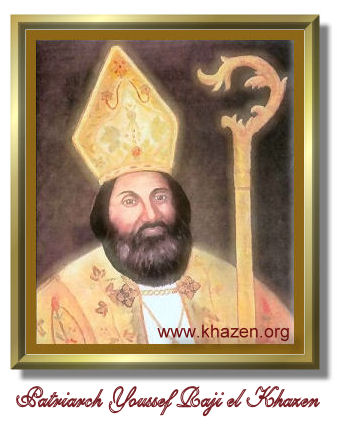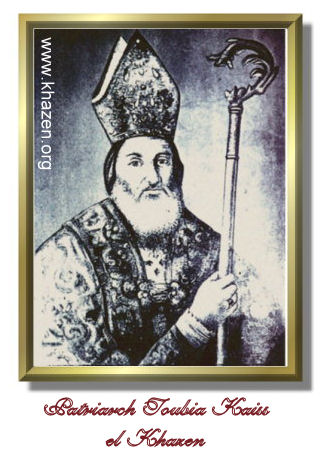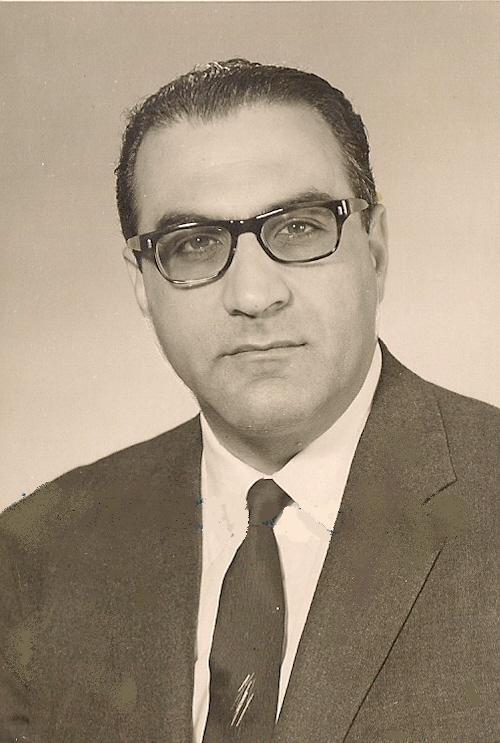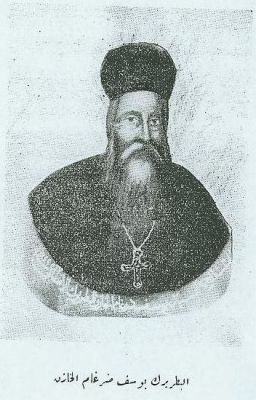Ziara el Khazen, wife of Cheikh Bishara Jaffal el Khazen Ziara is the wife of Cheikh Bishara Jaffa el Khazen, daughter of Sarda, son of Sherwan, son of Moussa, son of Tarabieh, son of Abi Nawfal Nader, son of Abi Saqer Ibrahim, son of Chidiac Sarkis el Khazen. She was gifted with a rare […]
Cheikh Bechara Jaffal el Khazen of Zouk Mikael is the son of Jaffal, son of Moussa son of Tarabieh, son of Abi Nawfal Nader, son of Abi Nader Khazen, son of Abi Saker Ibrahim who’s the son of Chidiac Sarkis el Khazen. Born in 1756, he held the position of Governor of the […]
Sheikh Rafiq el Khazen, second from the left Cheikh Rafiq el Khazen Son of Barbar Beik el Khazen known as أمير آلايالجند اللبناني and Therese Ghandour Beik Al Saad sister of Habib Basha al Saad, Rafiq el Khazen was born in 1909 in Baabda. He went to school in Antoura and […]
Barbar Beik el Khazen Barbar Beik el Khazen, son of Cheikh Fendi el Khazen and Sultana daughter of Cheikh Chahine el Dahir was born on September 21 1861. On 15 November 1896, he married Therese daughter of Ghandour Beik El Saad, sister of Habib Basha El Saad, who gave him four children: […]
Cheikh Philippe El Khazen is a proud member of the Khazen family. Philippe is an Operating Partner at Valor Equity Partners, a Chicago-based private equity and operational growth investment firm focused on non-control and control investments in high growth companies across various stages of development. At Valor, Philippe’s responsibilities primarily include interim portfolio […]
Important events during Patriarch Youssef Raji El Khazen’s reign Part1/3 1- During Patriarch Youssef Raji El Khazen’s rule, few priests were performing confessions outside the Lord’s house, thereby violating the church rules. Those forbidden practices were spotted by the Vatican, forcing them to issue a bulletin signed by the Pope Pius IX, […]

Biography
Patriarch Youssef El Khazen is the son of Abi Raji son of Younes son of Abi Sleiman son of Nader son of Khazen son of Ibrahim son of El Chidiac Sarkis El Khazen. Chidiac Sarkis El Khazen moved with his children from the town of Jaj to Bouar in Keserwan in 1545
Patriarch Youssef Raji El Khazen was still in school when he started his ecclesiastical career. He was a man truly devoted to God and was endorsed and blessed as a priest on the 6th of November in 1814 after receiving various previous honors. It was Bishop Youssef Khairallah Estephan who blessed his promotion to priest.
On the 6th of April 1830, he was named Damascus Bishop by Patriarch Youssef Hobeiche the great.
Patriarch Youssef Raji El Khazen was originally from Ajaltoun and followed his studies at the renowned and famous Ain Waraka school.
Maronite Patriarch
After the death of Patriarch Hobeiche, a general Maronite assembly was requested to vote for a new patriarch and took place 9 days after his death on the 16th of May 1845. This delay is mainly explained by the bad security situation in Lebanon due to wars back then.
Here is a list of the attendees at St.Maroun Church at the Maronite Patriarchal seat in the North.
Antoine El Khazen Bishop of Baalbeck
Youssef Raji El Khazen Bishop of Damascus
Semaan Zouein Bishop of Tyr
Abdallah Boustani Bishop of Sidon
Boulos Moussa Bishop of Tripoli
Youssef Rizk Bishop of Kawrach
Philippe Hobeiche Bishop of Hamah
Boulos Massaad Bishop of Tartou
Toubia Aoun Bishop of Beirut
Youssef Geagea Bishop of Cyprus
There were also two priests present, Youssef el Mareed and Boutros Mansour, in charge of keeping record of the elections and any incident reported.
The outcome of this assembly was voting for Youssef Raji El Khazen as the new Maronite Patriarch of Antioch.
Stories that followed Youssef Raji El Khazen’s election
Many rumors spread prior to Raji el Khazen’s election that election were a fraud and protested by many bishops and groups, however the Pope confirmed that Patriarch Youssef Raji El Khazen’s was genuinely elected and gave him the apostolic blessing.
One of the stories that were spread is found in Bishop Youssef el Debs book on Maronites’ history. He narrates that Bishops met in Our Lady of Mayfouk monastery after Patriarch Hobeiche’s death and voted for Bishop Youssef Raji El Khazen as the new patriarch and headed to the North patriarchal seat to confirm and celebrate the election. However Bcharreh residents regrouped and protested against the new Patriarch as they wanted Bishop BoulosMassaad to win and doubted the outcome of the elections.
Another different and more accurate interpretation of Youssef Raji’s election is found in Priest Mikhail Gabriel al Chebabi’s testimony:
“After Patriarch Youssef Hobeiche had died at the patriarchal residence North of Lebanon, all bishops agreed to hold a general assembly. They first called on all Bishops to come to the North for the voting, however many were worried that elections might not be held properly and the freedom of voting might be compromised by the place and time specially that Lebanon was in times of war. This led to the interference of French consul in Beirut who sent his personal associate to guarantee the adequate circumstances for holding the elections. After convincing all bishops to attend, Bishops from Keserwan were the first who headed to the St.John Maroun monastery in Diman. Being mostly from El Khazen noble family, locals in Bcharreh first sought Knights from the Khazen family came to impose their candidate for the new patriarchal seat, before the French consul intervened once again to ensure the legitimacy of the elections. Elections took place and Youssef Raji El Khazen was voted as the new Maronite Patriarch of Antioch. In an attempt to protest this outcome, certain groups tried to protest and make a scene before Sheikh Boutros Karam and French consul’s messenger calmed them down and advised them otherwise.
Patriarch Youssef Raji El Khazen was elected on the 18th of August 1845 as the new Maronite Patriarch of Antioch and he resided in Our Lady of Bechara in Zouk Mikael, Keserwan. Upon his election, he dispatched a letter to Rome through his messenger Nicolas Mrad asking for the papal blessing. Few days later, he received a letter from his beatitude Pope Gregory XVI blessing his victory and confirming the elections.

Here is a short biography of another great from El Khazen’s family who became Maronite Patriarch between 1756 and 1766. We will present in Part1 his early life and how he was elected Maronite Patriarch of Antioch before tackling his main achievements and the major incidents and events that occured during his 10-year rule.
Patriarch Toubia Kaiss El Khazen (1756-1766)
Sir Toubia El Khazen, son of Abi Kanaan Kaiss El Khazen, was serving as bishop of Palestinian city Nablus as of 1733.
He later was appointed as bishop of Tripoli and then Cyprus. During his stay in Cyprus, he was the sole representative of the Maronite Church and the Patriarchal seat in Qannoubine.
In 1757, following the death of Maronite Patriarch Semaan Awwad, Maronite bishops met in Aintoura Monastery to elect a new patriarch:
The list of Maronite Bishops attending the elections is as follows:
– Filipos el Gemayel Bishop of Lostra
– Estephan el Doueihy Bishop of Batroun
– Jebrail el Hasrouni Bishop of Akka
– Youhanna Estefan Bishop of Latakia
– Germanos Sakr Bishop of Tripoli
– Mikhail el Sayegh Bishop of Damascus
– Youwassaf al Debssi al Basketnaoui Bishop of Tyr
– Antoine Mahassib Bishop of Arka
– Youssef Hbeich Bishop of Sidon
– Youssef Estefan Bishop of Beirut
– Joachim Yammine al Hadnani Bishop of Ehden
– Arsanius Al Halabi Bishop of Baalbeck
As a result of their meeting, Bishop Toubia El Khazen was elected as the new Maronite Patriarch of Antioch on the 28th of February. Following his election, Toubia El Khazen appointed Bishop Arsanius Al Halabi as his representative and sent him to Rome to gain recognition and blessing from the Vatican and its head pope Benedictus XIV. The letter was dispatched on the 20th of March 1756.
Here is a summarized English translation of the letter end by Patriarch Tobia El Khazen to his beatitude the pope Benedictus XIV:
"O Holiest father!
I, your humble servant Tobia El Khazen, previous bishop of Cyprus and newly elected Patriarch of Antioch for the Maronite, bow to you respectfully and kiss your feet and cordially inform your holiness that Patriarch Semaan Awwad has passed away and we have conducted the habitual rituals and prayers for the rest of his soul. Due to his unfortunate death, my brothers and I met on the 28th of February in St Joseph school in Aintoura, and abiding by the laws and regulations of our Maronite church and the Catholic Church, elected yours truthfully as the new Maronite Patriarch, even if I find myself not worthy of such honor.
As it has been the tradition for hundreds of years, we found that it is our most sacred duty to inform your beatitude and holiness of the outcome of those elections and seek your blessing, as you are St.Peter’s successor who was told by Jesus to take care of his herd and bless his brothers in faith.
For this reason and more, I bow to you and solicit you to bless and recognize this election as such has been the tradition with my predecessors. Also, I ask your holiness to grant us the sacred shield and dispatch it with my messenger and brother Bishop Arsanius Al Halabi whom I’ve sent on my behalf given the difficulty of travelling and length of distance.
In this letter dispatched to your beatitude, I present myself as a loyal follower and servant of the Holy Catholic Church, and bow to serve the papal church and obey its fatherly advice, as well as God the savior and all the saints. I also promise to remain loyal to the church throughout my whole life, and abide by its divine decisions."
Dispatched on the 20th of March 1756
Your humble servant
Toubia Boutros El Khazen
Maronite Patriarch of Antioch
Here is another excerpt from a speech by the Pope Benedictus XIV upon his recognition of Patriarch Tobia Boutros El Khazen.
“As far as our brothers in faith the Maronites are concerned, they have so far shown loyalty and obedience and abided by our apostolic guidance, mainly after the dispute that erupted over the election of the late Maronite Patriarch Semaan Awwad. They have also requested the holy shield which was granted to their messenger after getting the cardinals’ approval. As such, and since the highly esteemed Patriarch Semaan has passed away, we believe his successor Brother Tobia El Khazen is worthy of such honor and recognition, as he fits all the necessary requirements and has fulfilled all needed conditions.”
This being said, Pope Benedictus XIV recognized the election of Maronite Patriarch Tobia Boutros El Khazen and granted him the roman pallium as a sign of appreciation and gratitude, along with the apostolic and fatherly blessing.
The Khazen family’s history has been aligned for decades with the Maronite Church’s history and has contributed actively to its widespread and greatness. One of the most notable Khazens to have entered the Church is Youssef Dargham El Khazen, as he has served the Maronite Church honourably for years and was elected as Maronite Patriarch in 1728.
Throughout the next few weeks, we will be posting about Patriarch Dargham, his personal life, his career within the Maronite Church and how he was voted Maronite Patriarch as well as the accomplishments during his 9 years rule.
In memory of Cheikh Philippe El Khazen – March 6th 1996
LE CORPS MEDICAL LlBANAIS EN DEUIL
LE PROFESSEUR
PHILIPPE EL-KHAZEN N’EST PLUS

La disparition soudaine de Philippe El-Khazen, professeur honoraire a la Faculté de Médecine de l’U.S.J., chevalier de l’Ordre du Cèdre et de la Légion d’honneur, a jeté la consternation dans les milieux médicaux, politiques et sociaux de la capitale.
Cet homme foncièrement bon et qui avait le culte de l’amitié, a succombé a une attaque cardiaque implacable.
Agrégé des facultés françaises en pathologie après des études médicales a la Faculté de Médecine de Beyrouth, il devait enseigner la pathologie avant de devenir médecin-chef de I’H6pital Libanais (Geitaoui) fonde par son père Ie Dr Hanna El-Khazen, Homme de grand bien, il n’a jamais hésité a faire profiter de sa science médicale un malade indigent.
Député au Kesrouan sous le mandat du président Chamoun, il déploya une activité remarquable au profit de sa région.
Foncièrement probe, il fut toujours un homme du dialogue profondément attaché au Liban.
Vice-président de la Ligue maronite, il accepta la vice-présidence Ie l’Union Démocrate Chrétienne Libanaise, membre de l’Union Démocrate Chrétienne Mondiale. Plusieurs membres de cette union furent ses hôtes de leur visite au Liban.
On doit au professeur Philippe El-Khazen des ouvrages et des articles de science médicale.
Ghosta, sa localité natale et le Kesrouan lui ont fait d’imposantes obsèques au milieu d’une foule émue.




